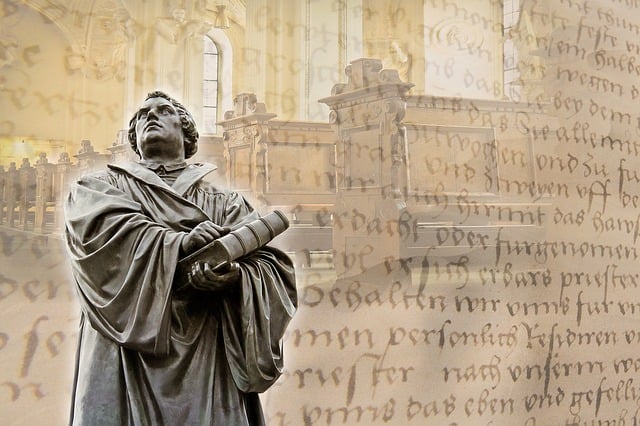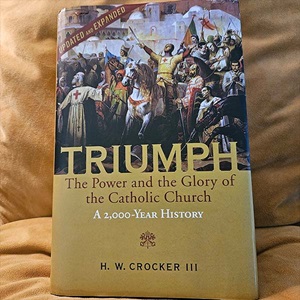Catholics, Know Your History!
Writer Mary McWilliams urges Catholics to embrace the Catholic Church’s history with all is blemishes and beauty, and to begin with the spirited re-release of, ‘Triumph, The Power and Glory of the Catholic Church.’
If Catholic news junkies have felt a bit twitchy that their church is the target of arrows firing from numerous directions, those nervous tics have merit. Assaults on the Catholic church worldwide have made frequent headlines: the Chinese Communist Party asserts heightened control on religious institutions in Hong Kong (1); militants attack Sunday worshipers at a Catholic Church in Burkina Faso, killing 15 brothers and sisters (2); and here in the homeland an investigation by US senators into deleted FBI records regarding a memo deemed “anti-Catholic” (3).
That was just in February. In January, the United States Conference of Catholic Bishops released its, “State of Religious Liberty in the United States,” citing the top five threats in 2024 that include increased attacks on churches, suppression of free speech, and mandates on medical professionals (4).
Which may make a bit premature the October 2023 updated re-issue Triumph, The Power and the Glory of the Catholic Church: A 2000 Year History. Or, given the barrage of threats, the timing may be fortuitous for author H. W. Crocker III and his press, Regnery Publishing, to offer this 600-plus page tome on such a lush, complex topic. Since this is a faith that has suffered strikes outside and within, going back to the days after the Lord designated a brash fisherman the rock on which he would build his church, wouldn’t it be reasonable to understand the threats and how they have been handled?

Have you ever succumbed to the argument that Martin Luther had “some good points” in his theses? Or bowed your head in shame over the Inquisition? Been lost on how to respond to criticism of Vatican II? Catholics, know your history; not only the Genesis account of Adam and Eve, original sin, and the lovely stories of Fatima and Lourdes, but of the Dark Ages, the Renaissance, the Reformation up to 20th Century, Nazism, Communism, schisms, heretics, and where we stand today: a culture that has determined a new era and dubbed it “post-Christian” as though Jesus Christ and his Salvation have become passe´ and given way to a movement that even Dr. Frankenstein’s “… dreams easily surpassed … transhumanism” (p. 541).
Know your history, with its deep, ugly, beautiful, and completely magnificent flaws and glory. Triumph presents it all. Two thousand years is a lot to take in, even snuggled down in the most comfy chair, but Triumph promises to be a “brawling, colorful history, full of pageantry and spirited polemic …” Mr. Crocker, a well-known novelist, historian, myth-buster, and lover of the faith, takes time to frame each era, tie it to the next, and expound on the politics, strategies, conflicts, players, and positions.
Revel in the chapter on Constantine and think of those altogether indifferent to any faith: “Constantine had nothing to gain by embracing Christianity – a small, unpopular, and persecuted faith. His mother was a Christian and his father had been sympathetic to Christians, but their influence was secondary. It was battle that convinced him — the Christian God delivered him victory at the Milvian Bridge” (p. 52).
The author tackles the Reformation with command, describing it as “… the worst cataclysm to befall the Western world since the sack of Rome in 410” (page 289). He explains Luther, described by one historian as “the most anal of theologians,” and how his “barbarian creed” became out of control because Pope Leo X tackled what he thought was a greater threat, the Turks’ invasion of Hungary and Germany with its lances set on the Holy Roman Empire. That is only one instance where Triumph offers insight into the quandaries popes underwent throughout time while navigating hostilities and juggling divergent and powerful leaders.
He addresses both the villains of the church, and the heroes. Charles of Hapsburg, who at age 20, denounced Martin Luther at Worms and remained loyal to the church, even when popes turned against him. Fr. Jerzey Popieluszko, chaplain of Poland’s Solidarity movement, who ceaselessly preached non-violence despite communists’ violence toward him, up to his murder (p. 507). Beloved Pope John Paul II who, with his keen intellect and intuition, understood that old methods no longer worked with modern political threats and introduced a new approach. “What was needed now was a new banner of religious freedom to challenge the primary threat to the faith — Communist totalitarianism. When the Council decided to put the liturgy into the vernacular, the future pope, who understood the primacy of culture, saw springs of popular renewal (p. 522).”
Mr. Crocker counsels that the church will be in conflict until the Second Coming. Jesus has already won the war, but the church militant still needs to fight battles without shame: “… there is no need for muting the trumpet, for fudging the truth to make it more palatable to its enemies, for prevaricating instead of being courageous” (p.537).
In Triumph, Mr. Crocker affirms, “The Catholic Church … is the most extraordinary story in the world. The Church is a great force, and perhaps through it – indeed, only through it —Christendom will rise again” (p. 541).

1 https://catholicvote.org/report-religious-freedom-collapsing-in-hong-kong
3 https://catholicvote.org/fbi-reportedly-deleted-info-related-to-anti-catholic-memo/
4 https://www.usccb.org/committees/religious-liberty/2024-annual-report
Knight and Castle Image by Dmytro from Pixabay
Martin Luther Image by Andreas Breitling from Pixabay